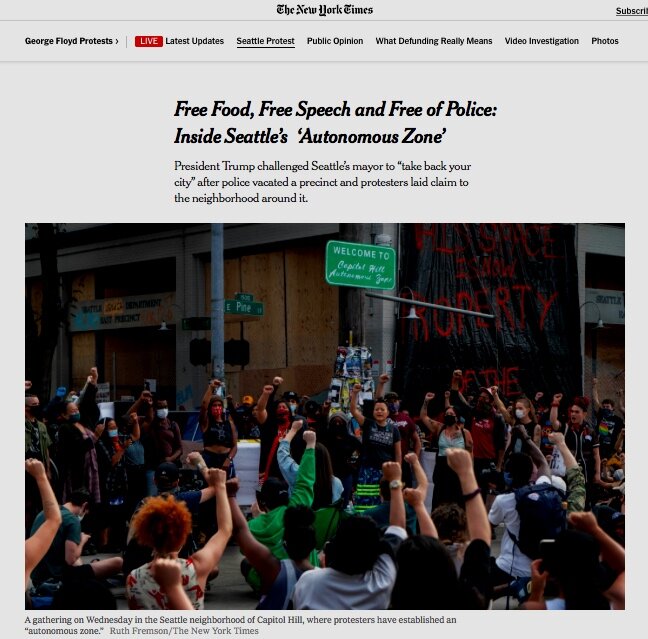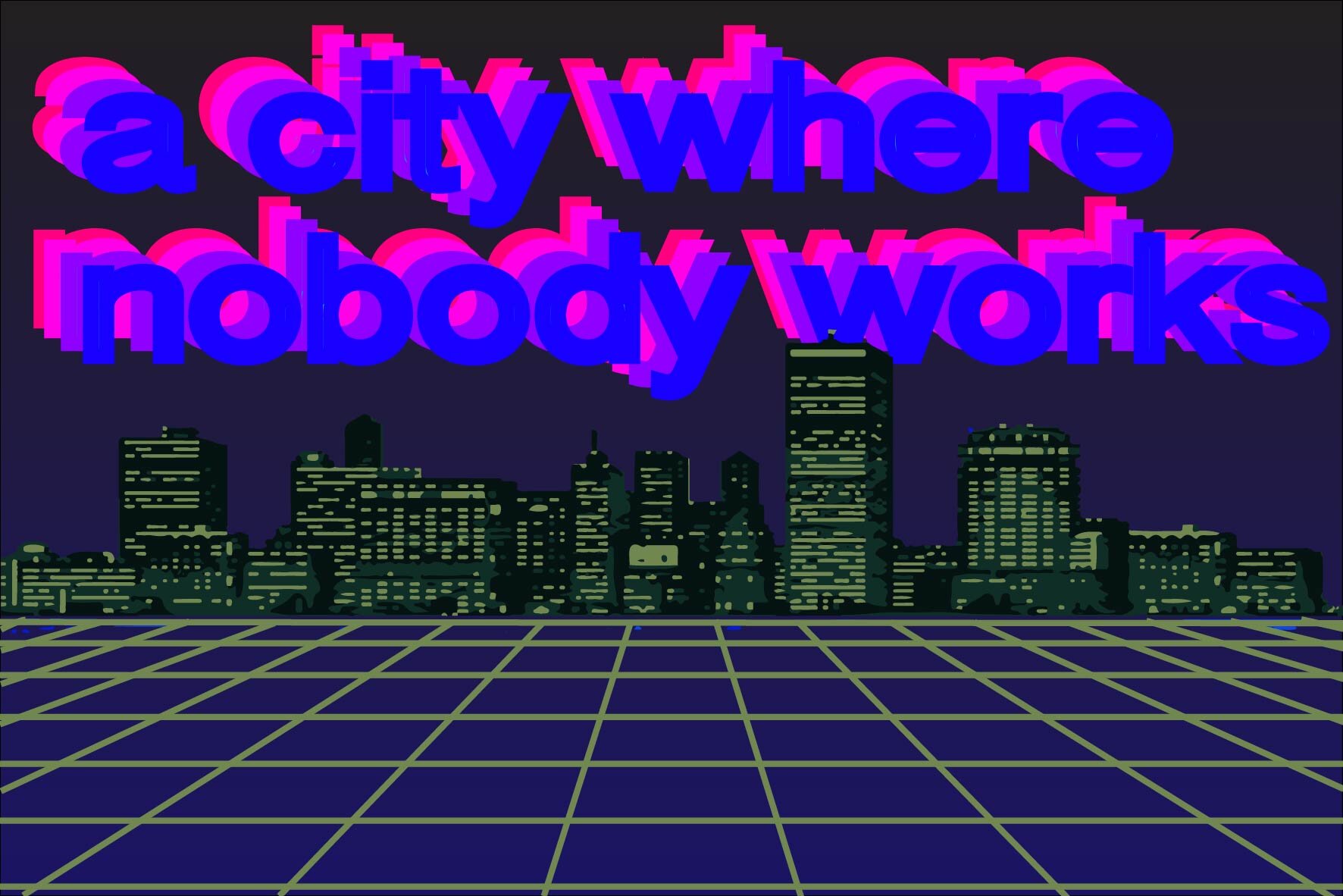It’s 2018. If you’re not fighting to establish alternatives to capitalism, you’re late to the party. Even many capitalists think so! For those of us who are already attempting to grapple with the enormity of replacing a globally hegemonic system of power and wealth accumulation that controls virtually every major political, educational and cultural institution on the planet, the task can feel so daunting as to be impossible. As Fredric Jameson has put it, it’s somehow easier to imagine the end of the world than the end of capitalism. Perhaps because of this, the cultural zeitgeist of the present is one of claustrophobic outrage—an understandable disposition when dysfunction and corruption reign in the absence of ready-at-hand alternatives.
Critiques of just about everything abound, and they can be indispensable tools for combatting complacency and naive tehcno-optimism. But they are a meager first step. What we need now are plans of action that are rooted in three indispensable soils: critical understanding of the flaws with the status quo, technical understanding of tools and technologies, and utopian imagination of how things might be otherwise. This writing offers insight into strategies for undermining and replacing capitalism, and as such, it is grounded in the three soils of critique, engineering and utopianism.
In 1899, Rosa Luxemburg posed the question of whether the left should embrace reform or revolution as a strategy for political and economic change, and the debate between proponents of these two directions has not ceased. Today, I would like to claim that both of these routes (as traditionally understood, anyway) are exhausted.
Progressives attempt to fix the system with reforms and regulations, mixing a little bit of socialism into their capitalist economy to keep it from burning itself up. These strategies worked when the global economy was tilted in the favor of the privileged classes of wealthy and powerful nations, but today, as Giovanni Arrighi has shown, the economy is tilting away from so-called “Western” nations, evaporating the viability and motivations for reform.
Historically, most anti-capitalist strategies (or at least the most visible ones) have sought to intervene in the historical process through revolution—that is, by capturing the means of production. This was the option embraced by Rosa Luxemburg. Yet, as a recent string of uprisings has shown, revolutions—especially when they are confined to one country or region—can leave the economic infrastructure untouched, and even usher in more repressive and unstable political regimes than what existed before.
In the face of the collapse of these experiments and the diminished viability and efficacy of reform, perhaps it is time to experiment with other strategies. Thinkers such as Eric Olin Wright, Paul Mason and J. K. Gibson-Graham have offered insight into post-capitalist politics and various strategies for how to build post-capitalist economic structures.
Because my own position in society happens to be in close proximity to “innovators” in the social, technological, financial, cultural, political and academic worlds, I have elected to outline a strategy that relies on private enterprise to advance post capitalist futures. I am especially interested in the prospects of viable and reproducible business models that, while they secure returns, simultaneously undermine capitalism in general by producing the requisite tools, technologies and networks for bypassing capitalist relations of production. To be clear: I do not believe this is the only or even the most effective way of replacing capitalism (I think we should seriously consider nationalizing AI and automation and set up a public trust fund that funds the transformation of cities into appropriate post-work environments and provisioning UBI dividends to collective households and organizations), but I do think that materializing alternative, better futures will require a multi-pronged approach that deploys vast and differing strategies in the production of new economic infrastructures. An additional clarification: I am not advocating the kind of social enterprises that simultaneously “do good and do well,” the flaws of which have already been thoroughly criticized by Slavoj Žižek. What I am suggesting is a viable mode of doing business that gradually phases out the private ownership of the means of production, and therefore its own basis for existence within the present society.
This project is closely related to accelerationism--a series of approaches that look to the internal dynamics and contradictions of capitalism itself to unleash social, political and economic transformations. In advancing such theories, left-accelerationist authors revive forgotten dimensions of the activist philosophy of Karl Marx, pointing to his lesser-known (than the Communist Manifesto) writings, and citing him as being an accelerationist himself (rather than a reformist). Perhaps surprisingly, Marx advocated free trade “in the revolutionary sense,” arguing that the reformist “protective system[s]” of his day were a conservative hindrance to the maturation of capitalist technical development and economic and social contradiction. The free trade system, by contrast, was “destructive,” pushing “the antagonism of the proletariat and the bourgeoisie to the extreme point” and “hasten[ing] the social revolution.” For Marx, Engels explained,
[o]nly under Free Trade can the immense productive powers of steam, of electricity, of machinery, be fully developed; and the quicker the pace of this development, the sooner and the more fully will be realized its inevitable results; society splits up into two classes, capitalists here, wage-laborers there; hereditary wealth on one side, hereditary poverty on the other; supply outstripping demand, the markets being unable to absorb the ever growing mass of the production of industry; an ever recurring cycle of prosperity, glut, crisis, panic, chronic depression, and gradual revival of trade, the harbinger not of permanent improvement but of renewed overproduction and crisis; in short, productive forces expanding to such a degree that they rebel, as against unbearable fetters, against the social institutions under which they are put in motion; the only possible solution: a social revolution, freeing the social productive forces from the fetters of an antiquated social order, and the actual producers, the great mass of the people, from wage slavery.
For Marx, then, the reformist state stood in the way of this “revolutionary destruction,” whose advancement was immanent from out-of-control over-investment, over-development, and the revolutionary expansion of technological capabilities whose full development would necessarily require the restructuring of society. Bertell Ollman, reflecting on the fragments that Marx actually wrote about communism, states that “[e]very significant advance in wealth, technology and science extends the boundaries not only of the real but of the possible, of the ways this newly won potential can be realized.”
Yet an absolute chasm exists between the development and acceleration of these technologies, capabilities and crises, and the implementation of alternative social, economic and political systems. As the history of the twentieth century shows, the monolithic suggestion of “revolution” leaves much to be desired, and many details unexamined. For this reason, it is worth considering what capitalism is, and how it relates to other modes of production.
In sum, I intend to argue that capitalism is one of several modes of production in operation today, and that it maintains a dominant relationship over the others. The next dominant economic system (if we’re fortunate enough to reach it), much like capitalism several centuries ago, will likely grow up around the edges and inside of capitalism, rather than entering the scene in a sudden apparition. It will likely exploit capitalism’s weak spots, under-utilized resources, and periodic crises, eventually establishing a dominant relationship over capitalism (rather than phasing it out altogether). If right now we live in a sea of capitalism that thrives off the richness of islands of non-capitalism, the future will likely resemble a sea of some other kind, with islands of capitalism and other types of economic activity, which will serve vital functions without determining society’s forms the way it does now.
Louis Althusser—a controversial author who wrote about the contingencies of capitalist reproduction—argued that “in order to exist, every social formation must, while it produces, and in order to be able to produce in the future, reproduce the conditions of its production.” This reproduction of the conditions of its production turns out to be a delicate and historically-variable process, whose basic requirements Althusser outlines, and which consist of capital’s domination over other modes of production; the reproduction of the means of production; the reproduction of the forces of production (that is: of labor); and the reproduction of capitalist relations of production—all of which are entrusted to the “state,” whose concerns extend beyond those of the short-sighted business enterprise.
According to Althusser, capitalism is a dominant mode of production that co-exists among various “dominated” pre-capitalist modes of production, and ensuring that it maintains this dominance is a major part of the state’s role. Non-capitalist modes of production generate value that capitalism continuously appropriates and accumulates—something that Rosa Luxemburg has shown to be indispensable to the survival of capitalism. In a process that Marx called “primitive accumulation,” commons are converted into capital, in order to add buying power to the system, which by definition cannot generate sufficient buying power on its own because of the deficit between what workers are paid and the value of their productive output (that is: the value that makes up profits). Because production is only profitable when goods and services are sold for more than what was paid to create/provide them, and all industries are operating this way, the amount paid to the total workforce will always be less than the value of the total sum of goods and services produced. The only way to sell the total mass of goods and services profitably is to find new markets for them, where value may be paid for them that was produced outside of the system of waged relations. For this reason, non-capitalist sources of value are indispensable for the survival of capitalism, and this, historically, has been the reason behind colonialism and imperialism, and “development” of the so-called “Third World.”
If this dominance is disrupted, resources and labor could feasibly circulate in non-capitalist ways (without monetary investment seeking return)—neighbors might help one another instead of hiring day laborers; co-operative organizations might produce their own cash crops for mutual consumption, rather than buying these on the market; commuters might adopt a mutual aid approach to carpooling; perhaps whole towns could elect to operate as a co-operative, as Marinaleda, Spain has done. In fact, these things often happen when the market takes a sharp downturn, leaving people and places and resources fallow. When the market fails, people generally seek out other ways of circulating value.
The “unity” between capitalism and the dominated modes of production is only the first precondition for reproduction. The state must also ensure that material conditions of production are maintained. This means that there must be sufficient effective demand for production, profitable reinvestment opportunities for accumulated capital, a sufficient workforce and/or energy source for production, a ready supply of raw materials, an infrastructural system capable of transporting goods and/or services and for importing raw materials, and a legal system of protection for productive processes and the enforcement of contracts. Broadly speaking, there must be a functional economy and a conducive environment in order to produce. If these material conditions are disrupted, production becomes extremely difficult (if not altogether impossible).
Thirdly, capitalist relations of production must also be maintained. In Capital, vol. 1, Marx states that “Capitalist production . . . under its aspect of a continuous connected process, of a process of reproduction, produces not only commodities, not only surplus-value, but it also produces and reproduces the capitalist relation; on the one side the capitalist, on the other the wage-labourer” (p. 578). In other words, it must be ensured that individuals continue to actually enter into capitalist relations of production, in which some people exchange their labor power for wages, and spend their wages on the output of capitalist production, and others invest their wealth into profitable capitalist production. These are not necessarily given conditions: potential laborers might find some other means of sustaining themselves; a would-be capitalist might refuse to invest in viable or productive ventures; a whole generation of people might elect to opt out of playing these roles in the economy and to engage in alternative relations of support and interdependency.
The state (whose theoretical job is to ensure the reproduction of capitalism) has two main routes for ensuring the reproduction of relations of production: through legal-political force, and through ideological persuasion. The former of these is rather straightforward: states often move to protect their economies and populations from threats, and very regularly exert force against potential disruptions. Yet force alone is insufficient for the maintenance of capitalist relations of production. This is where “ideology” comes in, and Althusser charts the many ways in which “ideological state apparatuses” such as schools, churches, various cultural institutions and other organizations intervene into the collective consciousness of the population in order to train and educate them and instill in them an ambition to work and to comply with the requirements of the economy and of society. Much of poststructuralist thought examines the alignment of subjectivity with the requirements of the state and the economy, focusing especially on the role of culture, of gender, of sexuality, of race, and of other dimensions of material and psychological life that contribute to the maintenance of the economic and political status quo and dominant relations of power. This is an extremely important literature for those considering the requirements of, and problems around capitalist reproduction.
The three primary ways to undermine reproduction correspond to the three main ways that reproduction is ensured: disrupting or reversing capitalism’s dominance over other modes of production, disrupting or reversing the material conditions of profitable production, and disrupting or reversing the alignment of individuals with capitalist relations of production.
Yet merely disrupting reproduction is irresponsible and undesirable in itself. It is not guaranteed that the suspension or failure of capitalist production will yield an ascendance of alternative structures, and so failing to provide or set in motion alternative channels for moving value and getting needs met is liable to leave many out in the cold. Already, major sectors of investment are accomplishing this when they profit from raising tuition, hyper-speculate on real estate, invest in damaging and unsustainable energy harvesting practices that have a diminishing rate of return, and profit from large-scale, low-margin retail in small communities where the money is pumped out of the locality. These are all instances of capitalist disruption, and they are consistent with the picture of accelerationism offered by Marx in his remarks on free trade.
Instead of merely undermining reproduction, post-capitalist business models should seek to reverse the process of primitive accumulation, turning capital back into commons while transforming social relations from exploitative ones to co-operative ones. Just as many newly-opened avenues for profit today come from salvage operations that sell off, degrade, and undermine infrastructures for future economic growth (and it’s not just Marxists saying this!), other business models can profitably produce the tools for interdependent existence outside of markets. This, ultimately, is the mission of organizations like the P2P Foundation, Shareable and Commons Transition, all of whom advocate commons-based peer-production approaches to value creation. “There is a growing contradiction between new relations of production emerging around the digital commons and the economies they are creating, and how this emerging prototype of a new mode of production is embedded within capitalism,” Michel Bauwens and John Restakis state in an article on Commons Transition. “In short, while more and more use value is created in and through the commons, only a fraction of this is being monetized. . . . This process requires the re-conception and re-alignment both of traditional commons and co-operative thinking, and practice, into new institutional forms that prefigure a new political economy of co-operative commonwealth.”
Yochai Benkler argues that we are witnessing this occurring all over the world. With digital commons and the proliferation of social networks and new tools for sharing value in a peer-to-peer fashion, the possibility for massive markets without middlemen is right at our door. What we see, he argues, is “a new mode of production emerging in the middle of the most advanced economies in the world" (The Wealth of Networks, pg. 6). It begins with information, he says, but the way that information is linked to the movement of real goods and services should not evade notice. Capitalist firms can be used to produce “transitional equipment,” if the production of this equipment is able to meet the criteria of production as well as the firm’s reproduction, even while undermining reproduction of the system as a whole by offering productive reinvestment into new configurations that are untaxed by capital. While the firm must reproduce itself through the production of products that have an exchange value greater than the costs of their production, the use values of these products is virtually unlimited. In this sense, then, if we adopt the term “hardware” to refer to the commodity that is produced by the firm (corresponding to a fixed exchange value), whereas the use value that is contained within the product’s “software,” there is an ongoing potential to generate commodities whose use is open-ended and empowering, facilitating the ability of its users to have direct economic relations with one another without external beneficiaries. The content of that software (its use value) can be antagonistic to capitalist accumulation, even if the price of the hardware (exchange value) is sufficient enough to be reproductive of the producing firm’s operating costs and capital expenditures. This distinction between the hardware and software, as well a the distinction between the firm and the system establishes the possibility for an antagonistic production of elements that undermine (universal) capitalist reproduction.
Promisingly, prominent capitalists are already advocating the use of business as a vehicle for accomplishing goals that go beyond profiting. Recently, BlackRock—the largest investment firm in the world—announced that it would demand that all companies in its 6 trillion dollar portfolio “do more than make profits—they need to contribute to society as well if they want to receive the support of Blackrock.” Alluding to the failure of governments to provide adequate nanny state regulations or welfare state provisions, the firm intends to change the way that private companies approach their contributions to the world. It’s not too far-fetched to imagine a new generation of investors who go one step further, only investing in companies that are working to build post-capitalist infrastructures, or investment firms that are owned by all, and which aim to build all of society’s wealth along multiple axes, rather than enriching a relatively small group of shareholders in a purely monetary fashion.
{complications of prefigurative politics and communization}
The aim of this short writing has been to identify the specific ways that capitalism is reproduced, to outline the theoretical case for post-capitalist production, and to locate the coordinates for such a practice within the Marxist and accelerationist theoretical traditions. By strategically producing products and tools that facilitate peer production and the co-creation of value, viable businesses can help to contribute to the generation of alternatives to capitalism. The point isn’t for the firm itself to be post-capitalist, but for its value proposition of its product or service or aggregated activity to be supportive of alternative economic and political configurations.
To end on a note of possibility, I would like to offer a number of general strategies that could be viable avenues for entrepreneurial activity in support of post-capitalist futures, all of which are attuned to the requirements of capitalist reproduction, and aim to bypass these.
-tools for egalitarian collaboration
-tools for self-valorization
-automation co-operatives that spin out universal basic incomes
-VC funds that strategically bet against sectors of the market while using returns to fund disruptive companies in that same sector
-“sharing” platforms that have monetized, barter and gift modalities, so that people can choose the economic system they use on a transaction-per-transaction basis
-products or services that facilitate communal habitation and shared resources
There are many, many more possibilities, and it is hoped that a whole generation of real innovators will design and implement ecosystems of firms that move in this direction.


















